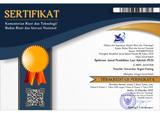The Influence of English Trainer Competence on the English Language Proficiency of Trainees in Community Learning Centers Across Banyuwangi Regency
 ), Ach Rasyad(2), Edi Widianto(3),
), Ach Rasyad(2), Edi Widianto(3), (1) Universitas Negeri Malang
(2) Universitas Negeri Malang
(3) Universitas Negeri Malang
 Corresponding Author
Corresponding Author
DOI : https://doi.org/10.24036/spektrumpls.v11i1.117394
Full Text:
 Language : en
Language : en
Abstract
This study aims to determine the influence of tutor competence on the English language proficiency of training participants. The researcher applied a quantitative correlational research design and used simple linear regression analysis. The population studied was all English language training participants in the Community Learning Center (CLC) of Banyuwangi Regency, with a total of 10 CLCs that provide English language training. The research was conducted over 5 months, from August to December 2021, with a sample size of 33 participants from 10 CLCs. Proportional random sampling technique was used to obtain the sample. Data was collected through the administration of a questionnaire as the primary method. The questionnaire was distributed to the 10 CLCs identified as the sample. The results showed that the tutor competence in teaching English has a score of 83.4%, indicating excellent competence, while the English language proficiency of the participants has a score of 65.4%, indicating moderate proficiency. The influence of tutor competence has a value of 0.405, which has a "moderately strong" coefficient interpretation, indicating a significant influence between tutor competence and English language proficiency. Additionally, the significance between the variables (X) Tutor Competence and (Y) English Language Proficiency had a sig value of 0.019, which indicates that if the significant value (0.019) < alpha (0.05), then Ho is rejected and Ha is accepted, which means there is an influence between tutor competence and the English language proficiency of training participants.
References
EF Education First. (2020). The World’s Largest Ranking of Countries and Regions by English Skills. https://www.ef.com/wwen/epi/
Firdaus, N. M. (2014). Dampak Pelatihan Bahasa Inggris Terhadap Kemampuan Berbicara dan Kepercayaan Diri Tourists Guide (Studi Kasus di PKBM Bina Terampil Mandiri Cisarua Bandung Barat). EMPOWERMENT: Jurnal Ilmiah Program Studi Pendidikan Luar Sekolah, 3(1), 71–77.
Moriand, A. (2017). Menurut Riset, Kemampuan Bahasa Inggris Orang Indonesia Masih Rendah. https://kumparan.com/millennial/menurut-riset-kemampuan-bahasa-inggris-orang-indonesia-masih-rendah-21dM5TYTAo/4
Muharramah, M. (2019). Kedudukan Bahasa Indonesia dan Bahasa Inggris Dalam Bidang Ilmu Pengetahuan di Era Global. Jurnal Ilmiah OSF.
Nurhayati, S., & Ayundhari, V. L. (2021). Persepsi Peserta Diklat Guru Bahasa Inggris terhadap Native Speaker sebagai Fasilitator. Diklat Review: Jurnal Manajemen Pendidikan Dan Pelatihan, 5(2), 161–166.
Saputri, Y., Purwito, L., & Widianto, E. (2019). Pengaruh Kompetensi Fasilitator Dan Hasil Belajar Peserta Pelatihan Keluarga Sehat. Jurnal Pendidikan Nonformal, 14(1), 22–36.
Setyawan, F. H. (2016). Meningkatkan Kemampuan Berbahasa Anak Usia Dini Melalui Model Pembelajaran Audio Visual Berbasis Android. Jurnal PG-PAUD Trunojoyo: Jurnal Pendidikan Dan Pembelajaran Anak Usia Dini, 3(2), 92–98.
Sugiyono. (2013). Metode Penelitian Pendidikan Pendekatan Kuantitatif Kualitatif dan R&D. Alfabeta.
Syahputra, I. (2014). Strategi Pembelajaran Bahasa Inggris Sebagai Bahasa asing Dalam Meningkatkan Kemampuan Berbahasa Siswa. Kutubkhanah, 17(1), 127–145.
Widianto, E. (2018). Pola Penyelenggaraan Pendidikan dan Pelatihan Di Balai Diklat Keuangan Kota Malang. Ilmu Pendidikan: Jurnal Kajian Teori Dan Praktik Kependidikan, 3(1), 40–49.
Widiastuti, Ani, Y., & Munthe, A. P. (2019). Pengembangan Diri Sebagai Fasilitator Belajar Pada Program Education Di Sentul Bogor. Prosiding Konferensi Nasional Pengabdian Kepada Masyarakat Dan Corporate Social Responsibility (PKM-CSR), 2, 782–790.
 Article Metrics
Article Metrics
 Abstract Views : 241 times
Abstract Views : 241 times
 PDF Downloaded : 78 times
PDF Downloaded : 78 times
Refbacks
- There are currently no refbacks.

This work is licensed under a Creative Commons Attribution-NonCommercial 4.0 International License.



